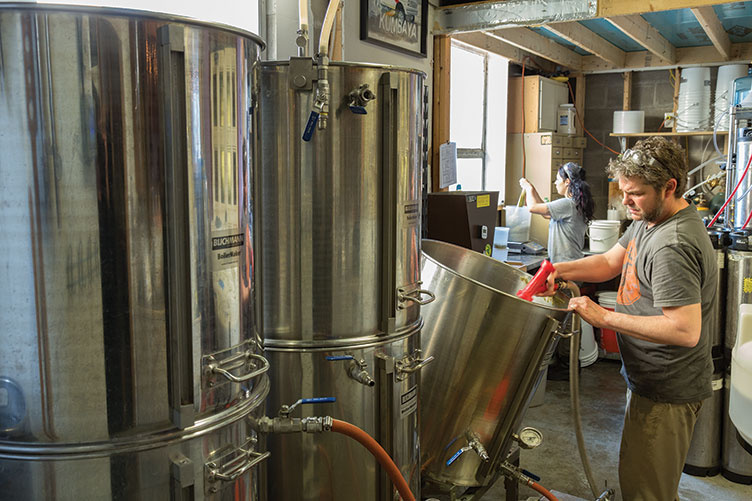
In 1999, when Peter Beauregard ’00 won over a sullen coworker with one of his homebrewed six-packs, the thought occurred to him that he might have happened upon something that could be his future.
Beauregard’s interest in beermaking had been sparked in class one day when the professor casually mentioned homebrewing. Not long after, Beauregard was walking by a homebrew supply store that he’d passed many times before. This time, he went in.
“I bought a kit and took it back to my apartment and started brewing in the basement,” Beauregard says. “After I graduated and got a ‘real job’ I had the money to start buying equipment.”
Fifteen years later, Beauregard left his job at a software company to open Stoneface Brewing Co. in Newington, New Hamsphire. So, future arrived.
He clearly was not alone. From 2008 to 2014, the number of craft breweries in the U.S. more than doubled, and a surprising number of UNH alumni have contributed to the boom. While homebrewing appears to be a shared starting point, there are other commonalities that led them to open their own breweries, like the desire to be inventive — to taste a beer and be instantly swept up in the idea of how to make it better. And the chance to do it their way, whether that means brewing with gruits instead of hops or adding flavors that often describe fine wines or using five kinds of hops for just one beer.
Then there is the aspect that personifies craft breweries: making beer in small batches, locally, often in old warehouses, on farms and in abandoned garages or in strip malls and industrial parks.
In other words, it’s about much more than drinking beer.

Stoneface Brewing Co.
Newington, New Hampshire, 436 Shattuck Way

Beauregard was striving to perfect his recipe for an India pale ale (IPA) when he struck upon what would later become Stoneface’s signature beer. In 2013, that recipe won the IPA category at the Boston Homebrew Competition. By then, Beauregard and fellow homebrew enthusiast and Stoneface cofounder Erol Moe had already been talking about leaving their high-tech jobs to go into business together.
“We wanted to be a self-funded nanobrewery but it just wasn’t feasible,” says Beauregard, a communication major at UNH. “The goal was to jump in with both feet and make a run at it.”
That run has turned out to be a strong one. Housed in an industrial building just off the Spaulding Turnpike, Stoneface Brewing Co. produced its first commercial batch in January 2014. Today Stoneface beers are distributed throughout much of northern New England. IPAs account for 65 percent of the production, although Beauregard says they are always experimenting. Smaller batches — one-offs — are served in the taproom that’s adjacent to the brewery.
During the first year of business, Stoneface (the name is a nod to the Granite State’s now-fallen Old Man of the Mountain) made 800 barrels of beer; 2016 production should hit 4,000 barrels. And still, Beauregard says, he is always looking to do better.

“I’m never really happy with any of our beers. I’m always critical of the taste, defining what it is that makes it ours,” Beauregard says. “I don’t think about it from the recipe-for-a-secret-sauce perspective. It’s more about the process. Any brewer can taste a beer and say ‘I can get something close to this’ but it won’t be the same. It’s the little changes.”
He compares the appeal of craft beer to his love of indie bands. “A lot of people find smaller bands more interesting,” Beauregard says. “When you and I and only a few other people know the band, you feel pretty cool. It’s the same with beer. You like drinking something that not everyone else is drinking.”
Idle Hands Craft Ales
Malden, Massachusetts, 89 Commercial Street
Christopher Tkach ’96 is another brewer whose award-winning home recipes encouraged him to start his own company. When Idle Hands Craft Ales opened in Everett, Massachusetts, it was with a one-and-a-half barrel system that Tkach had cobbled together himself.
This spring, the microbrewery moves to Malden with a 15-barrel system and three times the square footage of its old location. There, customers will be able to relax in a spacious taproom, enjoying samplings and beers by the glass and filling growlers to go. Idle Hands beers can also be found in area bars, restaurants and retail stores.

“Anyone that homebrews has a fantasy that they will open their own brewery some day,” Tkach says, admitting the brewing bug bit him hard. With a degree in civil engineering, he contends it satisfies his engineering and artist sides. “I get that itch scratched.”
Tkach has a preference for traditional Belgian and German-style beers with a twist. He likes the way they enhance the flavors of various foods.

“Brewing is very much scientific. There are steps that need to be followed but it comes down to creating, like a chef, combining flavors to come up with the end product,” Tkach says.
“That said, I never saw the need to add a lot of unusual ingredients to my beers. I focused on a specific style. It’s how I grew up brewing. I want my beer to taste like beer.”
The yeast strains he uses for his Belgian beers have spicy characteristics that can mimic pepper or coriander. Idle Hands’ Triplication, for example, has a spiciness balanced by flavors of bananas, peaches and pears.
“People want to try something unique — something that not everyone can get their hands on,” Tkach says. “There is also an appeal in a place that creates community spaces where they can sit, have beer and talk with their neighbor.”
Earth Eagle Brewings
Portsmouth, New Hampshire, 165 High Street

George “Butch” Heilshorn ’83 was a longtime high school guidance counselor when he and his brother-in-law Alex McDonald opened Earth Eagle Brewings in 2012. Two years later, Heilshorn quit his day job to make beer full time.
Half of those beers are gruits, brewed with herbs like anise seed and sweet gale, heather and juniper berries, mugwart and yarrow. The Portsmouth nanobrewery also is known for its IPAs, porters and stouts.

“I’ve always been a beer geek —I’m really fascinated with different types of beer,” Heilshorn says. McDonald shared that fascination.
Heilshorn’s herbalist wife, April O’Keefe, guides their penchant for the uncommon along with forager Jenna Darcy, who scavenges local fields and forests to find plants for Earth Eagle brews.
“The herbs are pretty much off the map,” says Heilshorn, who has a bachelor’s degree in business from UNH. “On any given day you never know what you will find here. That model of not knowing what’s on the menu appeals to me. It’s like, ‘feed me. Take my palate for a ride.’”
Earth Eagle opened offering tastings and growlers. They have since added food, cocktails and live music. The brewpub makes two barrels of beer at a time and brews three to four times a week. Small batches allow for greater experimentation. There are also meat beers, flavored with smoked moose, bear, pig or boar.
And the name? Heilshorn says it was inspired by a flock of wild turkeys he and McDonald happened upon one day. McDonald told him Native Americans called them Earth eagles.
“I haven’t been able to confirm that but it worked,” Heilshorn says, adding, “Every beer, every ingredient, every piece of equipment in here has a story to tell.”
Newburyport Brewing Co.
Newburyport, Massachusetts, 4 New Pasture Road
Chris Webb ’92, ’01G used a Venn diagram to help him find his future. The entries in his three overlapping circles — what he loved, what he’s good at and what the market would bear — led to the idea for the Newburyport Brewing Co., the first brewery in Massachusetts to distribute craft beer in cans.


Gaining a partner for the business took no more than announcing his intentions to his friend Bill Fisher. “I told him about my idea and he said ‘I’m in,’” Webb says of a conversation the neighbors had a few years ago.
When Webb told his father about his plans, former UNH professor of psychology Dwight Webb said his son needed to meet his beer-loving loan officer, Mike Robinson.
“Bill and I had been aggressively brewing a good beer but we knew quickly we needed a brew master,” Webb says. “Mike had been homebrewing in his basement for 17 years. He’s a savant.” When they offered Robinson the job of head brewer, Webb recalls, he said, “I’ve been waiting for someone to come discover me.”
Newburyport Brewery opened in an industrial park on New Pasture Road in 2013 and brewed its first beer on Valentine’s Day. By August, they were sold out. In 2014, annual production doubled to 10,000 barrels, elevating the outfit’s status to a regional craft brewery.

Ninety-nine percent of Newburyport Brewing products are shipped throughout New Hampshire and Massachusetts. (Delta Airlines carries their pale ale on the Northeast regional shuttle). Their offerings, which they only distribute in cans or kegs, include Newburyport Pale Ale, Green Head IPA and Plum Island Belgian White.
The brewery has a 1,000-square-foot taproom with live music Thursdays through Saturdays. They also host outdoor music festivals and have an online music series.
Of the competition, Webb says there is room for all. What’s more, beer makers are willing to help each other, sharing advice and encouragement.
“Everyone is very friendly even though it is a competitive marketplace. Maybe it’s about the little guy going up against the big guy,” Webb says, adding, “People who start breweries love beer and want to be part of this American craft beer revolution.”
Liars’ Bench Beer Co.
Portsmouth, New Hampshire, 459 Islington Street #4
Community was on the minds of Dane Nielsen and Dagan Migirditch, both 2008 graduates, when they landed on the name Liars’ Bench for the nanobrewery they’re opening in Portsmouth. It speaks, they say, to the interest people have in coming together over a beer and sharing a story or two.

Nielsen, who has a master’s in physical education and health, learned the brewing business at Magnolia Gastropub and Brewery in San Francisco. Since retuning to New Hampshire in 2015, he has been honing his skills at Smuttynose Brewery Co. Migirditch, an English major, has a history in the restaurant business capped by his current position as general manager of the Franklin Oyster House in Portsmouth.

Liars’ Bench Brewery Co., located in an Islington Street building that once stored plumbing supplies, will have a brewing capacity of 280 barrels a year (with room to grow to 700 barrels), a tasting area, bar and beer garden.
There’s a New Minor Brewing
The joke that some people make about college students majoring in beer takes on a different tone when you consider all the craft breweries that have opened around the country in recent years. In New Hampshire alone, the number nearly doubled between 2014 and 2015.
Add to that momentum the College of Life Sciences and Agriculture’s plan to offer a new minor in brewing starting in 2017 and the kidding goes, well, flat. While the curriculum is still in development, it will include topics such as the art and science of brewing, fermentation science and technology, ingredients, agronomics and sourcing and brewing production.
What’s more, students will have access to an analytical testing lab and a pilot brewery, both expected to open in early 2017. Currently only a handful of laboratories around the country provide testing services to the beer industry, and none are in New England.
Both the College of Life Sciences and Agriculture and UNH Cooperative Extension will also explore opportunities to support the brewing industry by growing varieties of winter wheat, oats, rye and other crops suited to the state’s growing conditions.
Now, who says you can’t have your beer and brew it, too?

“More and more people are willing to spend money on beer. It’s a creative outlet; they like to taste new things,” Nielsen says. “It’s progressive.”
Migirditch relates the allure of craft brews to an edible art gallery. “You go in and see what they created and you want to share that,” he says, adding that having multiple places to do that is good for everyone. “You wouldn’t go out and have three dinners but you might go out and have three beers. So, someone might come here and have a couple and then go somewhere else.”
Adds Nielsen, “People really like the appeal of one-offs — the idea that the beer they’re drinking may only be available for a single day.” And while he, too, enjoys the taste, drinking beer is also a means of research.
“Every beer I drink, I analyze — what’s the flavor, how did it get there, what do I love and why,” Nielsen says. “That will help us nail down our own flavors. That’s why they call it craft.”
Great Rhythm Brewing Co.
Portsmouth, New Hampshire , Bartlett Street
Great Rhythm Brewing Co. has been making beer for nearly four years, first in Massachusetts and then at Smuttynose Brewery Co. in Hampton. This spring, owners Scott ’07 and Kristen ’03 Thornton will move their brewing and bottling business to an old fish processing plant on Bartlett Street and begin serving their brews on site.
Scott Thornton worked as a commercial beer maker for eight years before he started brewing his own recipes in 2012. Since then the nanobrewery has been making between 1,000 and 2,000 barrels a year, selling them through five New Hampshire wholesalers. The move to Portsmouth’s West End will allow Great Rhythm to become a destination brewery with a tasting room and a beer garden overlooking tidal waters that feed the North Mill Pond.

The company’s name pays tribute to the couple’s love of music. Beer names like Resonation Pale Ale and Amplified Amber Ale exemplify their philosophy of “living life to the fullest with great friends, great music and great craft beer.”
Great Rhythm makes low ABV (alcohol by volume) beers that offer accentuated flavors without bitterness. “We thought, if you’re at a music show, what’s a beer you could enjoy — have three or four, say — and still be able to have a good time?” Thornton explains.
He uses spreadsheets to track recipe calculations so he’ll know how much malt will produce how much wort, for example, or to measure things like sugar content. And he also relies on taste.
“You develop a palate,” says Thornton, who majored in English. “Hops change year to year. Different varieties are going to give you different results. Year round, we’re trying to stay consistent. That’s one of the challenges.”
Another one, which has been met, was finding a location walkable and bikeable to downtown Portsmouth. That’s another facet of the craft brewery owners’ values, being accessible to their customers. Thornton likens that thinking to the rise of the slow food movement.
“People want to know where their beer comes from just like their food. They want to drink local,” he says. “There is a great community aspect to making beer.”

Originally published in UNH Magazine Spring 2016 Issue
Comment on this article.
Comments
You missed the Neighborhood Beer Company in Exeter. Two owners are UNH alumni.
— Kimberly Berwanger '95
-
Written By:
Jody Record ’95 | Communications and Public Affairs | jody.record@unh.edu


















































